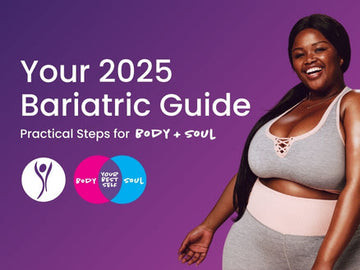by Brenda Hoehn on Aug 24, 2023

How to Love Yourself Pre- and Post-Bariatric Surgery

Weight loss surgery involves more than just undergoing the procedure, losing weight, and ensuring you get the right supplements. It’s a mental game, too. Your emotions and self-esteem can take a big hit before and after your surgery. It’s important to take care of your mental health and cultivate a strong sense of self-worth and self-love on your weight loss journey. After all, feeling good about yourself is the first step toward becoming healthy (and conversely, negative feelings can hamper your efforts, if you let them). If you’re on a weight loss journey right now, know that you’re not alone. Read on to find out how you can start loving yourself pre- and post-bariatric surgery.
Facing Your Own Hurdles
Undergoing bariatric surgery or gastric bypass surgery can evoke a wide range of emotions. You might feel hopeful and excited that you’re taking steps to control your health. On the other hand, you could be feeling apprehensive or even shame. This is perfectly normal. While everyone is different, many people who elect to have weight loss surgery experience certain types of hurdles. Here are a few of the most common ones:
- Emotional overeating. Seeking solace in food whenever you’re upset or having a bad day is often a common challenge for those who struggle with their weight. Eating food in search of comfort gives you a false sense of fullness in the face of stress and negative emotions. Unfortunately, weight loss surgery won’t magically change your relationship with food. You’ll need to address the feelings hiding behind your “hunger” to break the cycle of overeating.
- Transfer addiction. If you’ve had an unhealthy relationship with food – say, in the form of overeating or binging – you might experience transfer addition. So, instead of overeating, you may turn to drinking, smoking, or even exercising excessively as a way to cope with stress.
- Some patients may experience depression pre- or post-surgery. You might mourn the loss of your previous relationship with food and struggle with adjusting to your new life. Therapy, using proper coping mechanisms, holding realistic expectations about the weight-loss procedure, and finding support among friends, family, or a support group can help if you experience depression.
- Body dysmorphia. This is a condition in which you struggle to align your mindset with your reflection in the mirror. You tend to obsess over the imperfections of your body – flaws that are usually invisible to others. What this means for weight-loss surgery patients is that they often still see themselves as obese, even after they’ve lost a considerable amount of weight.
- Negative emotions and low self-esteem. While weight loss surgery can help transform your body, it can’t automatically change the thoughts and feelings you have inside. You may still have body image issues, even when you hit your goal weight. It’s very possible that you may continue to grapple with feelings of inadequacy, shame, guilt, and self-hatred, especially if they’ve been deeply rooted within your psyche for a long time.
Self-Love and Self-Acceptance Are Integral on the Journey
Weight loss a journey that involves your body and mind, and a successful journey typically starts with a positive mindset immersed in self-love and self-acceptance. Unfortunately, we may turn away from love, whether we realize it or not, because we fear hurt, pain, disappointment, failure, rejection, or judgment. Shielding ourselves and hiding from love, however, does nothing but fuel those same low emotional feelings we try so hard to avoid. In order to lead a happy, full, and successful life and achieve your goals – including your weight loss goals – you must choose to love and accept yourself unconditionally.
9 Easy, Proven Ways to Foster Self-Love
Loving yourself and cultivating self-compassion can help you overcome hardships and reach your goals. This self-love can set you on a path of finding the highest satisfaction in your life. Here are some ways you can begin shifting into a state of love and set yourself on the road toward success:
- Accept yourself fully. It may feel uncomfortable at first, but it’s so important to offer yourself unconditional love – just the way you are. You are worthy of love, no matter what flaws you may have. Let go of the illusion of perfection (because it doesn’t exist!) and be compassionate with yourself in all ways.
- Be truly grateful for your body. Without it, you wouldn’t be able to experience the joys of living. Treat your body kindly, fuel it properly, get plenty of rest, and remember to take time to do the things you love.
- Surround yourself with supportive people. Before and after your surgery, it’s important to spend time with your family and close friends in some form, even if it’s just a phone call. After all, they are the ones who know you best. Lean on your friends and family, especially when you find yourself having a hard time loving yourself.
- Use positive affirmations every day. It’s so essential that you speak positively and kindly to yourself. Barraging yourself with negative comments and thoughts does nothing but hurt you and impede your progress. Ask yourself how you would speak to your dearest friend, and then choose to speak to yourself in the same way. Look at yourself in the mirror and say simple positive statements like, “I love myself and my body,” “I am beautiful,” “I am strong and capable,” or “I deserve to be happy.” You may still have negative thoughts pop up unwantedly now and again, but they will fade as you continue to use positive affirmations.
- Stop comparing yourself to others. Comparison is the thief of joy. Take some time to unplug from social media or at least unfollow accounts that show pre- and post-surgery photos or make you feel inferior. Remember, everyone’s journey is different, and that’s okay!
- Create a positive environment. To foster self-love, it’s important that you establish and maintain a positive environment for yourself. In addition to surrounding yourself with supportive people, you should be choosy in the type of media you consume. Choose joy by believing in yourself, listening to positive music, and taking time to meditate or pray every day.
- Practice daily self-care. Self-care is not selfish – it is a necessity. In order to love and care for others, you must love and care for yourself first. Do things that fulfill your physical, emotional, and spiritual needs each day. Some great examples include taking a long bath, reading a good book, exercising, and spending time with those you love.
- Find a support group. Bariatric surgery support groups can really do wonders for your self-esteem. After all, they’re made up of people who have gone through the exact same thing as you, which can help validate your feelings. Find a support group to help you build kinship with others, learn helpful tips, and work toward a shared common goal. Online communities are helpful as well! Use #iambariatricpatient on social media to help you find the right support groups. Some good sources include: BariatricFoodie, Thinner Times, ObesityHelp, and ProCare Health’s support group.
- Talk to your healthcare professional. If you find yourself struggling with your mental health, don’t be ashamed. Your doctor or bariatric surgeon can be your greatest resource and can help you navigate your weight loss surgery with plenty of helpful tools. They can also help you find ways to increase your self-confidence and give you eating pro-tips.
ProCare Health Is Here for You.
We are committed to supporting your health during your unique weight loss journey. Our nutritional supplements are made with the best quality and bioavailability possible so you can get the most from each vitamin and supplement you take (and they’re quite delicious, too!) If you’d like to get started, learn more, or need additional help, please contact us at (877) 822-5808 today!

Your 2025 Bariatric Guide: Practical Steps for Body + Soul

Your Go-To Guide for Bariatric-Friendly Travel

